
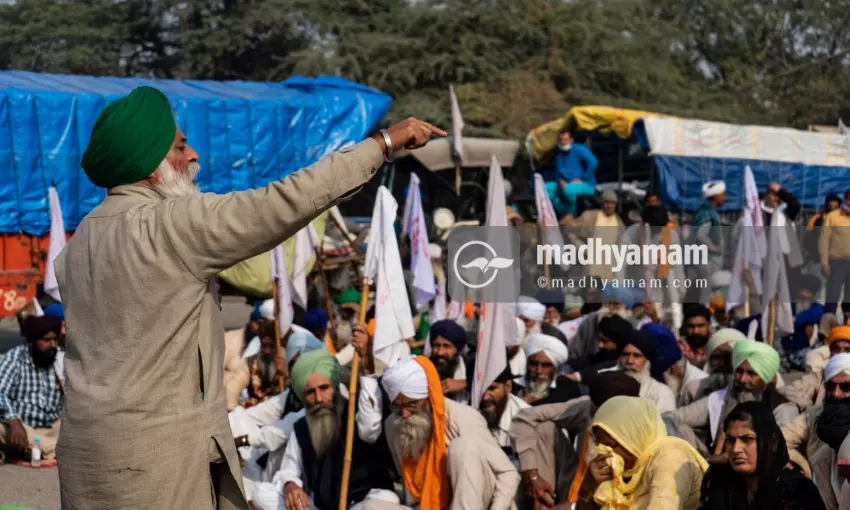
A picture from farmers' protesting site at Singur (Delhi-Haryana border)/Image Courtesy : Shaheen Abdulla
Why the farmers are protesting? All you need to know
text_fieldsFollowing the Bharath Bandh on December 8, the farmers addressed a joint press conference and claimed that they have got support from two more farmers unions and now they are a total of 32 organisations.
Farmer leader Gurnam Singh said that the government which said that it will not let the farmers enter Delhi has invited them for talks.
The deadlock between the farmers and the government is continuing with both sides not able to reach a consensus as the farmers stick to their demand that the three contentious farm laws be withdrawn.
Earlier, talks between the government and protesting farmers remained inconclusive on December 5,even after five rounds of discussions as the union leaders stuck to their demand for the repeal of the new farm laws, forcing the Centre to call for another meeting on December 9 to resolve the deadlock.
The farmers are protesting against the Farmers (Empowerment and Protection) Agreement of Price Assurance and Farm Services Act, 2020; Farmers Produce Trade and Commerce (Promotion and Facilitation) Act, 2020; and The Essential Commodities (Amendment) Act 2020.
Enacted in September, the three farm laws have been projected by the government as major reforms in the agriculture sector that will remove the middlemen and allow farmers to sell anywhere in the country.
However, the protesting farmers have expressed apprehension that the new laws would pave the way for eliminating the safety cushion of Minimum Support Price and do away with the mandis, leaving them at the mercy of big corporates.
Following are the excerpts from a book titled 'Farm Reform Amendments: A Death Warrant for Farmers' published in Malayalam penned by famous ecologist and writer K. Sahadevan and Dr. Smita.P. Kumar, which tries to unpack the complexities and confusions related to the reforms.
Which all are the ordinances newly passed into law by the Minister of Agriculture and Farms' Welfare?
The three ordinances that have been passed into Acts are:
1. Farmers Empowerment and Agreement of Price Protection Assurance and Farm Service Act 2020
2. Farmers Produce Trade and Commerce Promotion and Facilitation Act 2020
3. Essential Commodities (Amendment) Act of 2020.
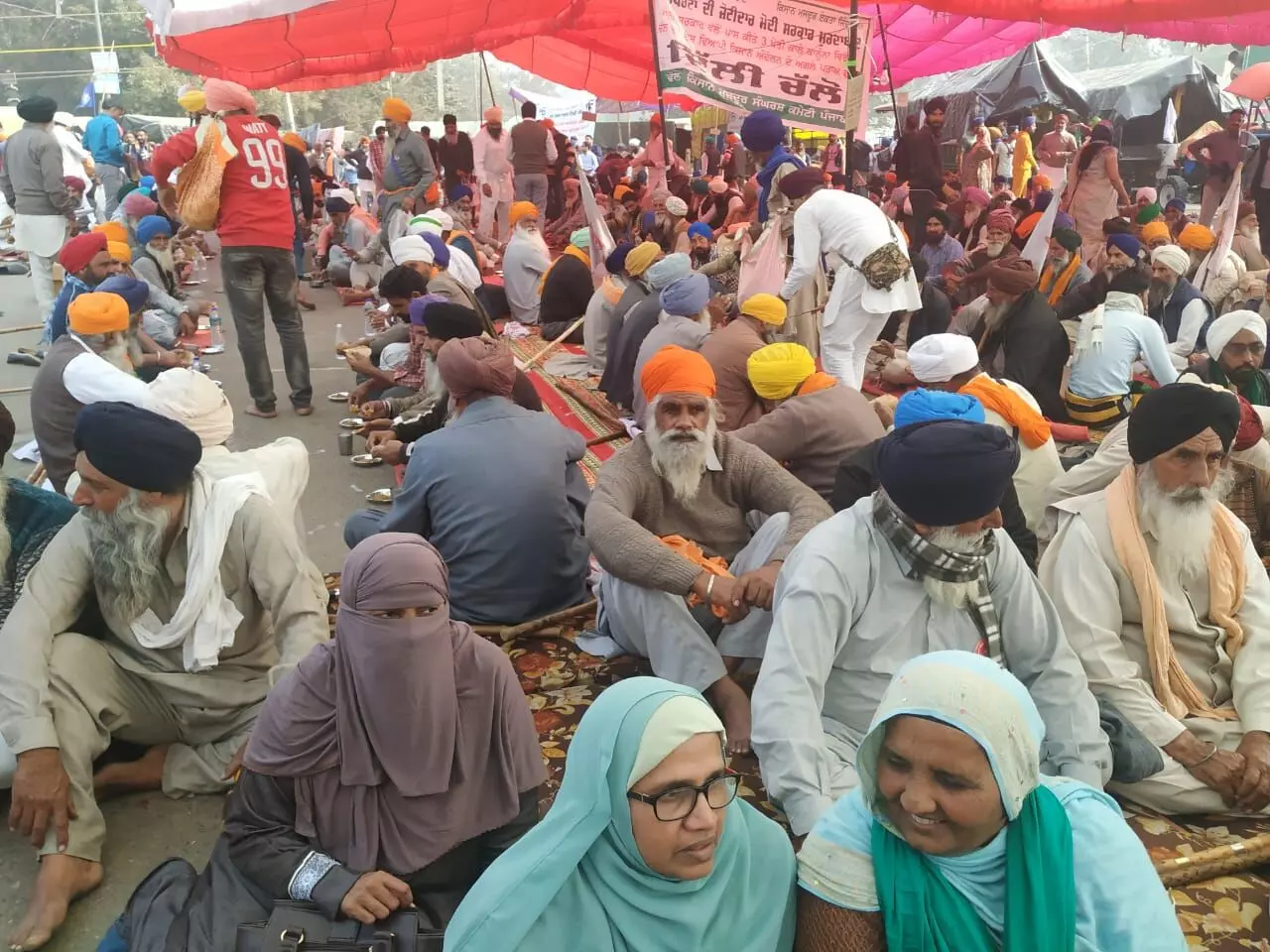
The Prime Minister himself has claimed that the new amendments are historic. Then why all this confusion?
There is no doubt in the fact that this is a historic move. Because, This reform, which has not even been consulted with state governments, while agriculture constitutionally falls under state list, is one of the worst moves in the country's history which is set out to weaken the federal structure of our state. Secondly, we have to ask why the rulers are silent about this context where a bill claimed to benefit farmers, has been approved in parliament without even a single discussion within the houses and with farmers' organizations, that too within four days. Moreover, why is Shiromani Akali Dal, an ally of the ruling government, opposing the reforms? Why have the farmers' organizations affiliated to RSS requested to send the bill for review by a Parliamentary select committee?
All this indicates that there are certain clear intentions for the Government behind this haste while approving these bills. We will understand, eventually.
The Prime Minister has accused that certain quarters are deceiving the farmers regarding the Minimum Support Price. What is the truth?
It is important to legally ensure that the farmers are provided with the assurance of minimum support price where ever they are selling their products, either government markets or private markets. The truth is that the new amendment does not provide any such assurances. There are no legal provisions other than fancy words that sugar-coat it. It is a long-standing demand of farmers to ensure Minimum Support Price for agricultural produce. Currently, the support price has been announced for only 23 crops. The government has not yet considered farmers' demand to extend this cover for other crops too. In fact, through legislation that makes the agricultural product marketing committees invalid, the state is throwing the farmers out in the free market for exploitation.
There are claims that through the ordinance, the government has revolutionized the farming sector by allowing the farmers to sell their products anywhere in India and thus by breaking the monopoly of state-controlled Mandis (Markets)?
We can see that these claims are hollow once we understand what is happening in the states where there are no government Mandis. In Bihar, APMC (Agriculture Produce Marketing Committee) are not working. There, the farmers are getting prices lower than that of the announced minimum price by the government. A table that shows the statistics from 2017 to 2019 is given below.
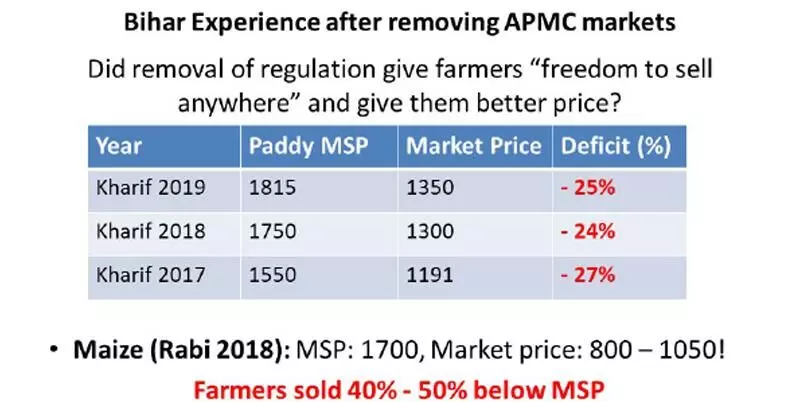
The statistics clearly show that private market prices are 25-50 percent below. In 2019, while the government announced Rs 1815 as the minimum support price for farmers, the farmers did get only 1350 in the private market. That is a 25 percent deficit! In 2018, when the MSP for corn was 1700 per quintal, the farmers had got only Rs 800 to1050 in the private market. That is a 40-50 percent deficit. It is now clear how things work in places where state markets are not active players.
Why are the farmers not provided enough assistance even with the presence of state-owned Mandis?
It is due to the incompetence of the government that the state markets and APMCs are not performing actively. Both state and central governments are equally responsible for this. Currently, only 6% of farmers can sell products according to the MSP. About 94% of others are still at the receiving end of exploitations by private buyers. The low number of government markets, the inaccessibility of markets due to distance, the slow technical and monetary processes have partly caused this crisis of farmers. The government is trying to privatize the farming sector by hiding the limitations caused by the state.
What are the merits of the new legislative reforms?
Most of the things mentioned in the new reforms are things that have already been initiated by the state through various ordinances in recent years. That is, the government has already started to act early to privatize and corporatize the agricultural sector.
A presentation (See Image 2) made by the Central Agriculture Ministry in July 2019 is given below
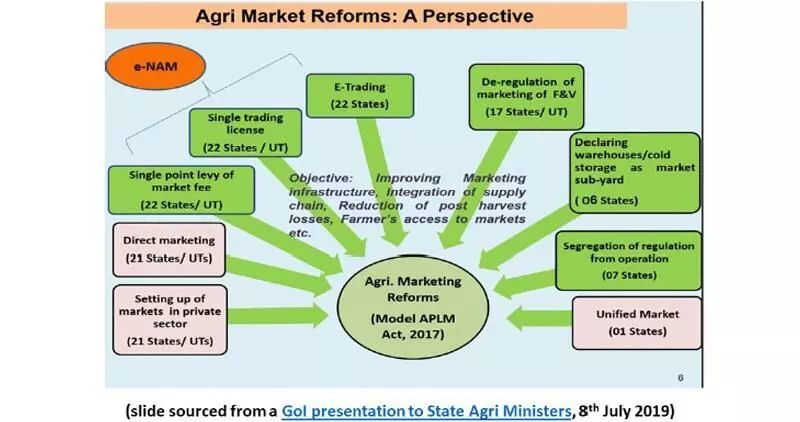
A close look at the the presentation will tell us that the ideas to remove market limitations and to provide private markets were planned well in advance. The state has tried to pass these bills in a hurry, that too at a time of a grave pandemic, aiming to forestall the expected massive resistance of the farmers.
Doesn't the new bill provide farmers the opportunity to sell their products to whoever they want with the prices decided by themselves?
Two kinds of markets are going to take shape in the country, post the bill. One is state-controlled markets. The state officials themselves will ensure that they do not work properly. There will also be taxes, cess, and all kinds of levies imposed. The second one will be owned by private agents and trade cartels. They'll work without government control, taxes, and any other limitations. Those who argue for this are the same people who advocate homogenization of everything, from language to pension.
What are the real demands of farmers?
We can summarise the long-standing demands of farmers like this:
1. Minimum Support Price for all agricultural produce should be announced incorporating in it production cost (Seeds, fertilizers, family labor) with the land rent along with the 75 percent of production cost. The state should ensure that MSP is a legal right. (Why the C2 formula of Swaminathan Commission is wrong can be understood from the article)
2. Increase the numbers of state Mandis (Markets), and procuring centres. There are 22,000 paddy procuring centers and 44,000 wheat procuring centers currently. The government has been hesitant in constructing new granaries for the past decade. There should be enough centres to store the agricultural produce securely.
3. Legislation should be reformed in a way that the benefit of subsidies and such other measures should reach the hands of farmers directly. Currently, these reachthe hands of the chemical fertilizer companies. This should be changed.
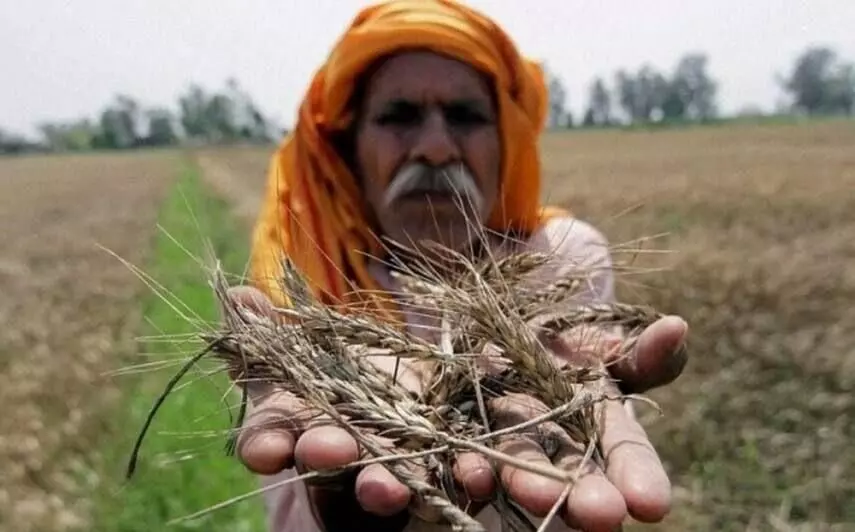
4. There should be legal reforms to assist small-scale farmers when agricultural loans are written off. Currently, the large scale farmers are the beneficiaries of this. Almost 85 percent of farmers in India are small-scale farmers, i.e. those who own land below five acres. They approach the local moneylenders for borrowing because they don't have adequate land documents. So, the state measures to write off loans mostly don't help them.
5. The government should resolve the clashes over agricultural lands and act efficiently to ensure enough land-possessing documents for farmers. There are lakhs of unresolved cases in courts related to these red tapes. The situation is so bad that the cases would still be left pending, even if all the courts in India work for all day for the coming ten years. So, there should be enough measures and government-controlled systems to solve this and ensure the farming land for farmers.
6. Forest Rights Act should be implemented. Only 4 percent of tribal have benefited from the Forest Rights Act passed in 2005. This creates a huge crisis for tribal farmers in forest areas. Doesn't the government claim that there will be large scale private investments in the agricultural sector through new amendments? Wouldn't that help the farmers?

There are many pieces of evidence in front of us that show the pathetic condition of farmers in countries where the government controls were lifted and corporate companies were invited for investing. The case of farmers in developed countries like the US and France, where the control over the agricultural sector was withdrawn from the 60s. is an example. The number of farmer suicides is also increasing in these countries. It is evident from the available statistical data that the income of farmers in America has gone down from the 60s. We don't have to go far for understanding how private corporate companies are anti-farmers. The instance in 2016 when the Pepsi company had sued Gujarati farmers is an example. The company had taken legal steps against the farmers who had cultivated FL 2027 variety of potato, which the company claims was their innovation. The farmers got escape from the legal trials only due to strong popular protests. No one can save farmers from exploitation once the state control over the agricultural sector is withdrawn and the right to determine prices is handed over to the private corporates.
(The excerpt was translated by Afeef Ahmed)























